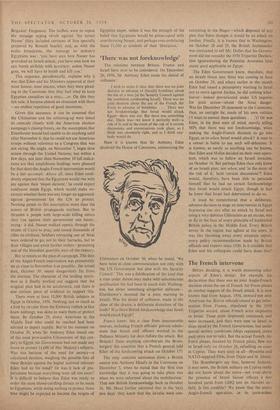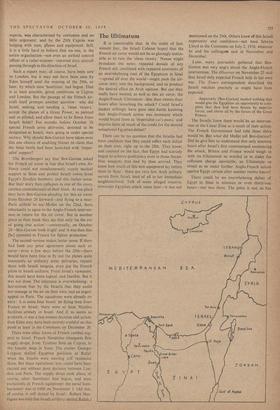The French intervene
Before deciding, it is worth examining other aspects of Eden's denial: for example, his declaration that there was no joint Anglo-French decision about the use of French Air Force planes in combat support of the Israeli attack. It is now known that from August, 1956, onward not only American but British officials ceased to get infor- mation from France, stipulated in the 1950 Tripartite accord, about French arms shipments to Israel. These arms shipments continued, and were increased; and they were sent to Israel in ships hired by the French Government, but under special secrecy conditions (ships repainted, crews paid extra not to talk). But the actual French Air Force planes, manned by French pilots, flew out to Israel only on October 29, refuelling en route in Cyprus. They were sixty in all—Mysteres and NATO-supplied F84s, from Dijon and St, Dizier.
The Brombergers say that, however fantastic it may seem, the British military on Cyprus really did not -know about the move—not even about the presence of Israeli liaison officers a few hundred yards from GHQ tent on Akrotiri air- field. Is this credible? We know that the entire Anglo-French operation, in its joint-action
aspects, was characterised by confusion and no little argument; and by the 29th Cyprus was bulging with men, planes and equipment. Still, it is a little hard to believe that no one, in the entire organisation—not even an airfield control officer or a radar-scanner—reported sixty aircraft passing through in the direction of Israel.
Such a report may, of course, have been sent to London, but it may not have been seen by Eden himself until the evening of the 29th, or later, by which time 'hostilities' had begun. That is at least possible, given conditions in Cyprus and London. But the passage of the French air- craft itself prompts another question : why did Israel, seeking and needing a 'clean victory,' accept the planes of a Great Power, so painted and so piloted, and allow them to be flown from Israeli fields? For months before October 29 special French arms deliveries, destined to be designated as Israeli, were going in under special secrecy. Why should Ben-Gurion have taken even this one chance of enabling Nasser to claim that the Sinai battle had been launched with 'imper- ialist' support?
The Brombergers say that Ben-Gurion asked for French air cover in fear that Israel's own Air Force could not simultaneously supply tactical support in Sinai and protect Israeli towns from Egypt's Ilyushin bombers, and this makes sense. But their story then collapses in one of the many careless contradictions of their book. At one place they have Ben-Gurion- pleading for this air cover from October 20 forward—and flying to a near- Paris airfield to see. Monet on the 22nd, there reluctantly to agree to the Anglo-French interven- tion in return for the air cover. But in another place in their book they say that only 'on the eve of going into action'—contextually, on October 28—Ben-Gurion 'took fright' and 'it was then that [he] appealed to France for fighter protection.'
The second version makes better sense. If there had been any prior agreement about such air cover—even a few days before the 29th—there would have been time to fly out the planes quite innocently as ordinary arms deliveries, repaint them with Israeli insignia, even put the French pilots in Israeli uniform. From Israel's viewpoint, this would have been logical, and feasible. But it was not done. The inference is overwhelming: a last-minute fear by the Israelis that they could not manage in the air on their own, and an urgent appeal to Paris. The squadrons were already on alert : it is some four hours' jet flying time from France to Israel; there were at least Mystere facilities already in Israel. And if, as seems so probable, it was a last-minute decision and action, then Eden may have been entirely truthful on this point at least in the Commons on December 20
There were other forms of French combat sup- port to Israel. French Nordatlas transports flew supply drops, from Tymbou field on Cyprus, to the Israelis deep in Sinai. The cruiser Georges L4gues shelled Egyptian positions at Rafah when the Israelis were meeting stiff resistance there. But these operations, too, could have been carried out without joint decision between Lon- don and Paris. The supply drops took place, of course, after 'hostilities' had begun, and were exclusively of French equipment; the naval bom- bardment was at 0400 on November 1. (All this, of course, is still denied by Israel : Robert Hen- riques was told that Israeli artillery shelled Rafah.)











































 Previous page
Previous page